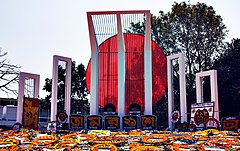 |
| source |
She is a mother
Living in every land
Blessing her children
With her love
Which her words carry
Suckling them
With its blessed touch
Raising them
In their cadence of warmth
Giving them
All her strength
To stand upright
When tyranny’s hands
Shoot them with hatred
Mother comes out
As drops of fragrant bloom
From the deep wound
Of the heart
And fills the world
* Language Movement Day or Language Revolution Day or Bengali Language Movement Day (Bengali: ভাষা আন্দোলন দিবসBhasha
Andolôn Dibôs), which is also referred to as Language Martyrs' Day or Martyrs' Day (Bengali: শহীদ দিবস Shôhid
Dibôs), is a national day of Bangladesh to
commemorate protests and sacrifices to protect Bengali as
a national language during Bengali Language
Movement of 1952.
In
1952, Bengali students in East Pakistan rose up and protested against the
Pakistani government for declaring Urdu as the national language. The majority
of the Pakistani citizens (as of 1952), about 54% of the citizens, were Bengali. In the protest several students died
for defending the Bengali language
for themselves and for the future generations.
I sense through this piece that we can be loved and belong not only in family but in our wider cultural family
ReplyDeleteI should have put the Bangladesh history in the prompt, so I thank you for including it here. I don't take it lightly.This mother, so poignantly described in your poem, is vital to culture. The new USA, with its high sounding declaration of independence, almost succeeded in killing her off in indiginous peoples. What a crime.
ReplyDeletewhat a moment in history...as wiping out a language would be like wiping out a bit of their history as well....which lives in them...and the blood that was spilled...
ReplyDeleteMothers are our stone. Our rock. A place for comfort and healing. This is beautiful, Sumana :)
ReplyDelete"Mother comes out...from the deep wound of the heart and fills the world." What amazing lines those are! Thanks for the history. I did not know that had happened. A fantastic poem, Sumana.
ReplyDeletei find it sad for those who don't have mother's like in your poem... she is usually the one most dependent on and sometimes least loved
ReplyDeleteWhat a significant piece of history. Thank you for writing about this Sumana. Sad that some had to die to protect what is rightfully their heritage.
ReplyDeleteLanguage is our mother and there is something unspeakably cruel to
ReplyDeleteforce people to abandon their birthright. This happened in Australia too but is little known as the original inhabitants weren't even counted until 1967! We are such foolish people.
It is so heartrending when appeals for simple freedoms are dealt with, with violence and even death. It is profoundly sad, to see such barbarism (indeed, all over the world) at this stage of human "civilization".
ReplyDeleteyou have stated well how words and language can be a song of joy and then be used like slings of piercing weapons. then how one's language of their mother country can be used to subjugate.
ReplyDeletegracias for this important piece
A heartfelt poem.
ReplyDeleteInteresting information. The way to cultural annihilation is to ban language and ritual. Glad you have remembered the martyrs.
ReplyDeletehow brave for those students to protect the language ~ I appreciate the backgrounder notes Sumana ~ Love that heart that fills the world ~
ReplyDeletePowerful and meaningful poem...thank you for the notes as well.
ReplyDeleteSumana,
ReplyDeleteA magnificent poetic tribute to the Bengali language and those who were martyrs. In some areas of the Gaelic speaking world, Ireland and Scotland, people strive to keep these fading languages alive.
Eileen
Very powerful poem. I'm sure that there would've been the same feeling in India when Hindi was declared the national language with so many different languages spoken all over. Our languages and traditions carry on regardless of National rules. I know in my home it does. Superbly written Sumana.
ReplyDelete